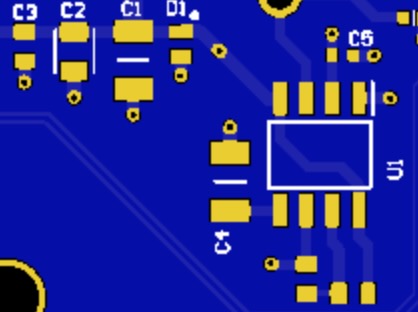Exact Measurement? For Innovation, and Progress
A coherence-based Noise Reduction System, approaches a time-independent reference, or exact standard, for the measurement of time. Download summary of scientific research here.
This Cool New Technology Is An "Innovation Amplifier"
Today, we are living in the age of ubiquitous computing where chips or artificial intelligence, are present in almost all electronic devices we use on a daily basis. These small but powerful devices, known as microprocessors, are used in a wide variety of applications, ranging from simple gadgets like calculators and digital watches to sophisticated systems like computers, servers, and smartphones.
These microprocessors can be programmed to do almost anything one can imagine, making it possible for any tech-savvy individual or company to build their own device. Want to build a smartphone? No problem, just get a chip designed for smartphones, install the necessary software and voila! Your smartphone is ready. Similar things can be done if you want to build a computer or a server.
However, while these chips can perform a vast range of tasks, each is generally designed to perform a specific function. Therefore, the performance of any electronic system can be improved significantly if a universal chip that can enhance the efficiency of all electronic systems could be developed.
One way this can be achieved is by designing a chip that reduces measurement uncertainty, which would in turn improve the accuracy and precision of the timing in every electronic system. Currently, every electronic system uses a timing mechanism for synchronization, data transmission, and a host of other operations. Reducing the timing error will therefore significantly boost the performance of all these systems.
A chip like this would be a game changer, revolutionizing the electronics industry in a very fundamental yet profound way. This innovation would create an avenue for groundbreaking advancements in various sectors including communication, healthcare, automotive, aerospace, and more.
The possibilities would be endless. Faster data transfer rates would be achievable, paving the way for improved high-speed communication systems. With increased precision in timing, automated systems would be more accurate and reliable, bringing about advancements in sectors like self-driving cars and industry automation.
In a nutshell, while the array of specialized chips we have now have catalyzed the evolution of technology in unprecedented ways, a universal chip that can improve the effective and efficient functioning of all electronic systems would take this evolution to new and unimaginable heights. The development of such a chip, though challenging, could unlock new frontiers in technology, catalyzing further innovation and development.
Innovative Technological Development Becomes Practical...and Profitable, With One Simple Upgrade
Truly innovative and sustainable development emerges as an immediate living reality when we upgrade our existing technologies with exact measurement. The transformation to a problem-free world can be accomplished today by reducing measurement uncertainty within our existing technological systems through a new approach to reducing noise.
This one technology upgrade improves both technological and human performance, as well as our relationship with the environment. The reduction of measurement uncertainty fulfills the goals of the three main approaches to sustainable development; The techno centric approach, the human centric approach, and the eco-centric approach.
This broad range of measurable results (seen in the research) arise because the measurement of time stands at the foundation of our modern technological systems, which are the basis of our global systems. And when our technological systems become more effective and efficient, through the exact measurement of time, they are functioning more in accord with the full range of the laws of physics and the universe. They now support the greater ecology. This one refinement to the way we measure time has a beneficial impact on all levels; economic, social, and environmental.
Useful Areas Of Application
- Reduce measurement uncertainty to improve signal quality over time
- Increase the phase coherence within systems
- Increase the dynamic stability of extended networks such as the IoT.
- Improve cognitive ergonomics, to increase EEG brain coherence, and improve task performance
- Reduce fatigue and stress while increasing team flow to more easily innovate and solve problems
- Improve inter-connectedness and the quality of life for society
- Reduce pollution and ecological disruption to eliminate the clash between progress and regenerative/sustainable development
Upgrading The Foundation Of Artificial Intelligence
Artificial intelligence, as the root of our modern technologies, cannot be truly sustainable and friendly to humans and the planet until it is fully aligned with the cycles and rhythms of natural law. Superficial upgrades to technology and improvements to human experience with AI have value, but will leave us feeling unsatisfied, and continue to cause errors, noise, stress and pollution until artificial intelligence is sustainable at its most fundamental levels. When artificial intelligence is based on exact measurement of time, human experience with our technological systems will be fully satisfying.
For total regenerative/sustainable development, both our technology and our brains need to be upgraded from being based on partial knowledge to being total knowledge-based. Total knowledge-based technology becomes possible when science and technology have gained the ability to access and practically apply the unified field — the total potential of natural law. A total knowledge-based brain becomes possible when we transcend the limitations of time and space to experience the underlying unified field directly.
For sustainable development to reach the full potential of its definition, the artificial intelligence which runs our technological systems would need to enable access to the full range of knowledge, or cosmic intelligence. This goal can be achieved by enabling a technological system to access the unified field so it can function in alignment with all the laws of nature, or that cosmic intelligence which has run the entire universe forever. This may seem a daunting task until you realize that all the known laws of nature obey one common law: The law (or principle) of least action.
Using More Of The Full Potential Of The Laws Of Nature To Achieve Sustainability
Through a noise reduction approach which enables a system to automatically function using more of the full potential of the law of least action, a technological system can easily align with all the laws of nature to function more effectively and efficiently. By reducing noise most fully in this way the system ultimately achieves a time-independent reference at the level of the unified field (10 to the minus 33 centimeters or smaller). This process of aligning with nature’s organizing power is consistent with the 3rd law of thermodynamics, which sets the conditions for a system to function in a more orderly, more sustainable, way.
For humans using such a system, the most striking benefit is an immediate increase in brain coherence. Brain coherence has been positively correlated with higher moral reasoning, greater creativity, better grades in school, improved task performance, and many more beneficial qualities of the brain. This total knowledge-based approach to upgrading technology to be more sustainable, should be applied globally to quickly resolve our existing challenges.
Note: All fields of science and technology have measurement at their root. Accessing measurement singularity/exact measurement, which is now accessible in every measurement, is the easiest way to create a common ground for the various fields working on ways to make life better for everyone. The various fields depend on technology for their research. Teamwork is based on a common vision/ a common goal. When these groups have access to the direct experience of cosmic intelligence through their computers, they automatically think from a broader perspective while they focus sharply on their own areas. This way they will see the inter-connectedness of the various fields, and will more easily be able to communicate and work together to achieve a greater level of accomplishment than any one field can reach on its own. This quality of being able to easily work together when the technological systems become more stable through reduced measurement uncertainty, has already been successfully demonstrated at the International Monetary Fund: https://www.upgradingtechnology.com/improveorganizationalbehavior.html
Measurement of time is critical for innovation and sustainable development. The exact, both precise and accurate, measurement of time makes systems sustainable over time, as we can see in the pattern created by the perfectly precise motions of Venus, the earth, and the sun...the measurement system in use by natural systems has withstood the test of time.


Areas of Application of Coherence Technology Pdf download here: https://www.upgradingtechnology.com/support-files/areasofapplication.pdf